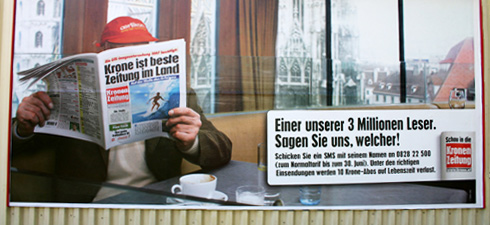Democracy and freedom of the press are clearly defined concepts – or so we thought till now. But the latest news about the Kronen-Zeitung front may be cause for cogitation. De jure everything is kosher. The laws of parliamentary democracy and constitutional freedom of the press have not been infringed. And yet there’s something terribly wrong going on nonetheless.
The editor-in-chief of Kronen-Zeitung (commonly known as the “Krone” – i.e the “crown” – for short) does not like the EU. He takes a shine to one Hans Peter Martin, an independent MP who isn’t keen on the Union either. For weeks they campaign at full tilt [for the European elections]. And Hans Peter Martin rakes in 17.7% off the cuff. The leader [Werner Faymann] of the SPÖ [Social Democrats] flings himself at all-powerful Uncle Hans’ feet in his famous letter of submission. [In 2008, in an open letter to the editor of the Krone, the candidate for the chancellorship switched sides without apprising his party, now calling for European treaties to be ratified by referendum rather than parliamentary vote in Austria, thus aligning himself with the near-hysterically Europhobic paper]. Faymann promptly became the paper’s pet, which in turn boosted his popularity ratings.
Uncle Hans doesn’t like immigrants either. So the legislature ratchets up the immigration laws, and, save the Greens, none of the parties dares to object. Uncle Hans dumps his protégé Faymann and starts plugging for Josef Pröll for chancellor. And the latest buzz is that he has had enough of Heinz Fischer, the hitherto utterly uncontested Austrian president. Hans need only say the word and the whole republic pricks up its ears. The outcome of this duel is up in the air.
Can it be that a single, solitary man of 89 years of age calls the politics shots in Austria? Not parliament, not the parties, not the public. That is a feat that, however horrible, compels respect. Hans Dichand has discovered that letters to the editor can be political wonder weapons. Two pages daily, with a pithy mnemonic phrase in bold print top right to set the topic. This mnemonic is then taken up by loyal readers and varied day by day.
Neues Deutschland [the Communist party mouthpiece] used to employ the same method in East Germany. People knew back then what to think of that. Dichand can rightly say that Austria, unlike East Germany, is a constitutional state and his readers are free citizens. It’s only a matter of picking the right letters, and the chief personally attends to that. Next act: talks with politicians. Wolfgang Schüssel has recounted how that works. If you make our issues your own we’ll back you, Uncle Hans gives his interlocutors to understand. Those who say no end up paying for it, as a rule, with their careers.
Abraham Lincoln once said democracy could exist without government better than without a free press. In the latter, citizens exchange their views on matters that concern everyone. Classic democracies have lived for decades on this democratic public debate. Is this era nearing its end? A high-calibre symposium was held recently called “Auslaufmodell Demokratie?” (“Democracy: A Phase-Out Model?”). In Russia the term “sovereign democracy” is gaining currency, while in China they talk about “authoritarian democracy”. Austria bids fair to enrich this debate with the phenomenon “media democracy”.
This innovation would furnish food for thought in political science. Only it is not an academic matter: its effects are felt by all Austrians.
Do you like our work?
Help multilingual European journalism to thrive, without ads or paywalls. Your one-off or regular support will keep our newsroom independent. Thank you!











